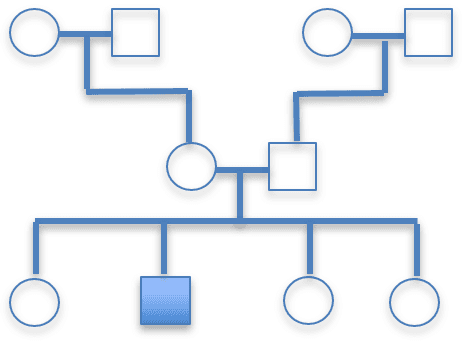The inheritance of biological sex and sex-linked genetic disorders
I can explain how the inheritance of chromosomes determines biological sex in humans, and the inheritance of sex-linked genetic disorders.
The inheritance of biological sex and sex-linked genetic disorders
I can explain how the inheritance of chromosomes determines biological sex in humans, and the inheritance of sex-linked genetic disorders.
These resources will be removed by end of Summer Term 2025.
Lesson details
Key learning points
- During sexual reproduction, an individual’s biological sex is determined by the chromosomes they inherit.
- In humans, the 23rd pair of chromosomes are sex chromosomes; XX in females and XY in males.
- A gene on the Y chromosome triggers the development of testes, which make male sex hormones (androgens).
- Interpreting, completing and constructing Punnett squares showing the inheritance of human sex chromosomes.
- Some disorders are caused by alleles on the sex chromosomes, so have sex-linked inheritance.
Keywords
Sexual reproduction - The process of producing offspring where a male and a female provide half the genetic material via gametes.
Biological sex - Male or female as determined by the combination of sex chromosomes inherited (i.e. XX female, XY male).
Sex chromosome - The chromosomes that determine the reproductive and secondary sexual characteristics (i.e. X and Y).
Sex hormone - Chemical messengers, secreted by glands, that help to control the reproductive and secondary sexual characteristics.
Sex-linked disorder - An inherited condition determined by alleles carried by the X or Y chromosome.
Common misconception
Males only have Y chromosomes, only males inherit sex-linked conditions.
Males have one Y and one X chromosome, males only need one recessive allele to suffer from a sex-linked genetic disorder, whereas females need two and therefore the condition is less common in females.
To help you plan your year 10 biology lesson on: The inheritance of biological sex and sex-linked genetic disorders, download all teaching resources for free and adapt to suit your pupils' needs...
To help you plan your year 10 biology lesson on: The inheritance of biological sex and sex-linked genetic disorders, download all teaching resources for free and adapt to suit your pupils' needs.
The starter quiz will activate and check your pupils' prior knowledge, with versions available both with and without answers in PDF format.
We use learning cycles to break down learning into key concepts or ideas linked to the learning outcome. Each learning cycle features explanations with checks for understanding and practice tasks with feedback. All of this is found in our slide decks, ready for you to download and edit. The practice tasks are also available as printable worksheets and some lessons have additional materials with extra material you might need for teaching the lesson.
The assessment exit quiz will test your pupils' understanding of the key learning points.
Our video is a tool for planning, showing how other teachers might teach the lesson, offering helpful tips, modelled explanations and inspiration for your own delivery in the classroom. Plus, you can set it as homework or revision for pupils and keep their learning on track by sharing an online pupil version of this lesson.
Explore more key stage 4 biology lessons from the Inheritance, genotype and phenotype unit, dive into the full secondary biology curriculum, or learn more about lesson planning.

Equipment
None required.
Content guidance
- Depiction or discussion of sensitive content
Supervision
Adult supervision recommended
Licence
Starter quiz
6 Questions


Exit quiz
6 Questions
Production of offspring by the fusion of gametes.
In humans, features determined by the 23rd chromosomes.
In humans these can be X or Y.
Chemical messengers that control reproduction and some characteristics


